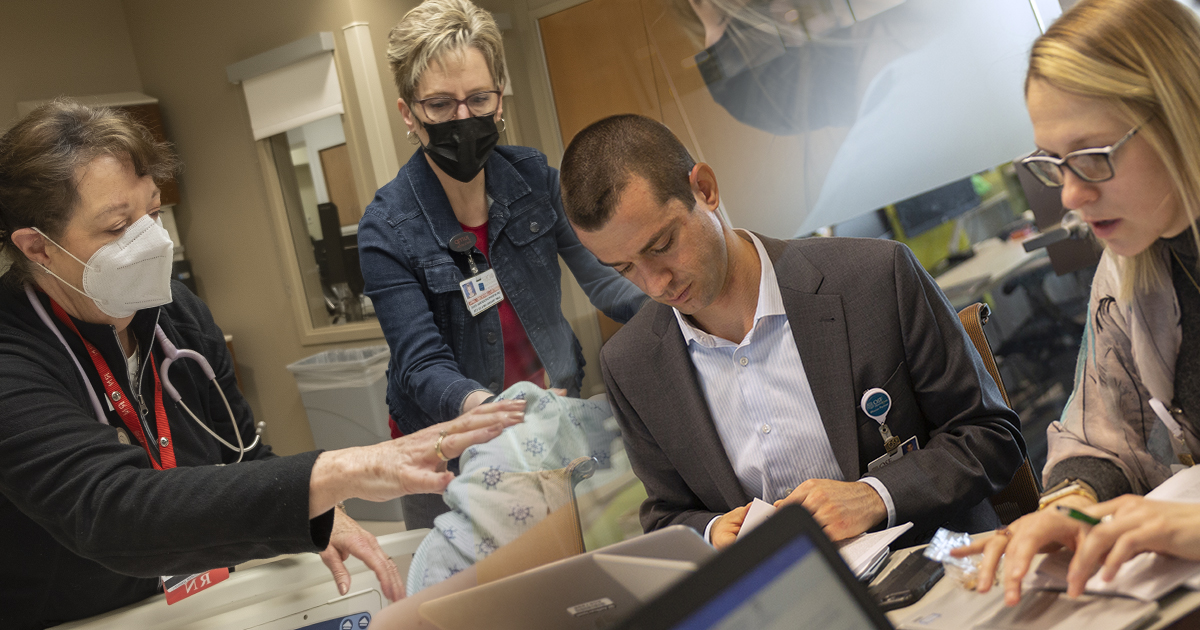
Reflecting on 2021
It’s easy to think that not much has changed since the initial start of COVID-19. The virus still kept many people at home this past year. Cases have continued to fluctuate. And it doesn’t appear that the illness will leaving us any time soon.
But we also have many things to celebrate. Countless people around the world have been vaccinated. A majority of kids are back in school. And numerous individuals have gone back to visiting family, traveling and living like as close to usual as they can.
As 2021 comes to a close, we want to reflect on the projects our teams within OSF Innovation have achieved to transform education, care and services for this new normal. They are accomplishments that will better help our communities and the people we serve.
Hospital at home
In the beginning months of COVID-19, OSF Innovation leaders had the foresight to consider how the virus would impact hospital care. With that, a multidisciplinary team came up with an idea to help OSF HealthCare treat both COVID-19 patients and non-COVID hospital patients at home. Using an agile approach to project management, the group designed the OSF Digital Hospital at Home and Acute COVID@Home programs to treat people using video conferencing and other technology. The learnings from this project have been transitioned to OSF OnCall Digital Health for further development. You can read more about this story here.
Addressing health inequity
While OSF Innovation is working on a variety of projects to improve community health delivery and wellness outcomes in Chicago’s most underserved communities, we want to celebrate two initiatives that launched this year. First off, OSF HealthCare announced a partnership with the University of Illinois Chicago (UIC) to establish the Community Health Advocacy (CHA) program. The grant program will fund projects between UIC faculty and OSF Mission Partners that address health and wellness challenges in urban communities. Read the full story here.
OSF also announced a partnership with Sustainable Wellness through Innovation, Technology, & Collaborative Health, an organization launched by City Tech Collaborative (City Tech). As part of the collaboration, SWITCH and OSF HealthCare are exploring the possibility of expanding and commercializing OSF CommunityConnect (OCC), a software platform to improve access to health care, education and disease prevention in the Chicago area. It’s also being used in partnership with the Medicaid Innovation Collaborative to create solutions that improve access and quality of care for Medicaid patients throughout the state. Learn more about this partnership here.
Bringing Mission Partner ideas to fruition
The OSF Innovation Studio was launched to help Mission Partners bring their health care solutions to life and eventually to market. The OSF Innovation Studio has received more than 125 concepts since 2019 with some moving on to full invention disclosure or the commercialization process. Nearly twenty are progressing through a product development process. And the OSF Innovation Studio has filed its first non-provisional patent in the US, Canada and Europe.
One solution the team is helping to commercialize was developed by two OSF nurses. They created a medical device table that surgical teams use to pull any implant information they may need during a surgery.
In a year and a half, the OSF Innovation Studio helped the small team refine their concept into a web-based application that allows for a more robust and editable database. Surgical teams within OSF Saint Francis are now using the Implantable Device Matrix app on a regular basis. The inventors are working with the OSF Innovation Studio on the opportunity to file a provisional patent on their idea. And plans are underway for commercialization. Check out our case study on this story here.
Adapting to changes in education
Jump Simulation Mission Partners did a lot of work behind the scenes to ensure clinicians and students were getting the practice they needed to fulfill training and continuing education requirements during COVID-19. That included brainstorming ways to deliver quality learning opportunities while adhering to restrictions and guidelines by the Centers for Disease Control and Prevention.
With simulation specialists taking the lead, they developed on-site learning protocols, adopted digital platforms and used teleconferencing to serve as many learners as possible — all without sacrificing the world-class learning experiences we are known for. Take a look at some the actions Jump took to continue delivering world class education.
Mapping out the future of neurosciences
Leaders at OSF HealthCare Illinois Neurological Institute wanted a clear vision for the future of its service line. As a result, the group worked with Performance Improvement to map out the next seven to ten years of the Neurosciences Service Line using the future back strategy process. This approach gives an organization the opportunity to define its future and then work backward to implement the actions needed to follow that path. Learn more about this process here.
Looking forward to next year
We are likely to feel the ongoing effects of COVID-19 well into 2022. That paired with the need to address ongoing and new challenges will require us to develop a multiyear strategy.
Over the next year, we will develop a future back plan that will guide our future endeavors. In the meantime, we are equipping our Mission Partners with the competencies they will need to design our future.
We are building capabilities to ensure we solve the right problems and deliver the right solutions. And we are embracing new approaches to solve our most complex problems.